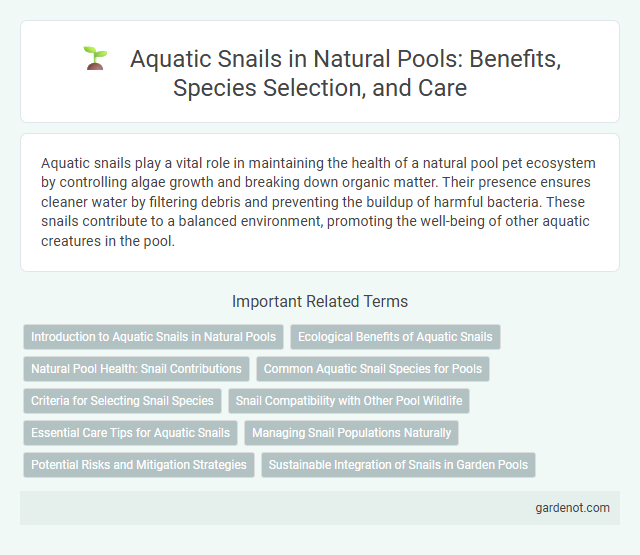Aquatic snails play a vital role in maintaining the health of a natural pool pet ecosystem by controlling algae growth and breaking down organic matter. Their presence ensures cleaner water by filtering debris and preventing the buildup of harmful bacteria. These snails contribute to a balanced environment, promoting the well-being of other aquatic creatures in the pool.
Introduction to Aquatic Snails in Natural Pools
Aquatic snails play a vital role in the ecosystem of natural pools by contributing to water quality through their algae-eating habits. These mollusks aid in maintaining a balanced environment by breaking down organic matter and preventing excessive algae growth. Their presence supports biodiversity and helps sustain the natural filtration process essential for clear, healthy water.
Ecological Benefits of Aquatic Snails
Aquatic snails play a crucial role in natural pools by controlling algae growth and contributing to water clarity through their grazing habits. They facilitate nutrient cycling by breaking down organic matter, which supports the overall health of the aquatic ecosystem. Their presence enhances biodiversity and promotes a balanced, sustainable environment within natural pools.
Natural Pool Health: Snail Contributions
Aquatic snails play a vital role in maintaining natural pool health by controlling algae growth and breaking down organic waste, which helps preserve water clarity and balance. Their grazing activity promotes nutrient cycling and reduces the buildup of harmful bacteria, enhancing the natural ecosystem's stability. Snails also serve as bioindicators, signaling changes in water quality and supporting overall aquatic biodiversity in natural pools.
Common Aquatic Snail Species for Pools
Common aquatic snail species for natural pools include the ramshorn snail (Planorbidae), which helps control algae by grazing on surfaces, and the bladder snail (Physidae), known for its rapid reproduction and ability to consume detritus. Pond snails (Lymnaeidae) contribute to maintaining water clarity by feeding on decaying plant matter, promoting a balanced ecosystem. Selecting these species supports natural filtration and enhances biodiversity within natural swimming pools.
Criteria for Selecting Snail Species
Selecting aquatic snail species for a natural pool requires evaluating their algae consumption rate, reproductive behavior, and environmental tolerance. Species such as the Nerite snail are preferred for effective algae control without overpopulation due to their limited reproduction in freshwater. It is crucial to ensure compatibility with pool chemistry, temperature, and other aquatic life to maintain a balanced ecosystem.
Snail Compatibility with Other Pool Wildlife
Aquatic snails exhibit high compatibility with various natural pool wildlife, such as fish, amphibians, and aquatic plants, contributing to a balanced ecosystem. Their grazing on algae and detritus helps maintain water clarity and quality without disturbing other inhabitants. Species like Nerite and Ramshorn snails coexist peacefully, supporting biodiversity and natural filtration in the aquatic environment.
Essential Care Tips for Aquatic Snails
Aquatic snails thrive best in natural pools with clean, well-oxygenated water maintaining a pH between 7.0 and 8.0 and temperatures ranging from 68degF to 82degF. Providing a balanced diet of algae, decaying plant matter, and specialized snail food ensures optimal health and shell growth. Regular pool maintenance, including removing excess debris and avoiding copper-based treatments, prevents harmful conditions and supports the snails' essential biological functions.
Managing Snail Populations Naturally
Aquatic snails play a crucial role in maintaining the ecological balance of a natural pool by controlling algae growth and recycling nutrients. Managing snail populations naturally involves promoting habitat diversity and introducing natural predators like fish or amphibians to prevent overpopulation. Ensuring balanced water quality and avoiding chemical treatments supports a healthy snail ecosystem without disrupting the pool's natural environment.
Potential Risks and Mitigation Strategies
Aquatic snails in natural pools can introduce potential risks such as clogging filtration systems, spreading parasites like schistosomiasis, and disrupting the ecological balance by overgrazing on algae. Mitigation strategies include regular monitoring, introducing natural predators like certain fish species, and maintaining water quality through proper circulation and filtration. Implementing biological control methods minimizes the use of chemical treatments, preserving the pool's natural ecosystem.
Sustainable Integration of Snails in Garden Pools
Aquatic snails play a crucial role in the sustainable integration of garden pools by naturally controlling algae and maintaining water quality without chemicals. Their biodegradation of organic matter reduces the need for artificial filtration systems, promoting an eco-friendly ecosystem. Selecting native snail species ensures balanced biodiversity while supporting the garden pool's natural biological processes.
Aquatic snail Infographic

 gardenot.com
gardenot.com